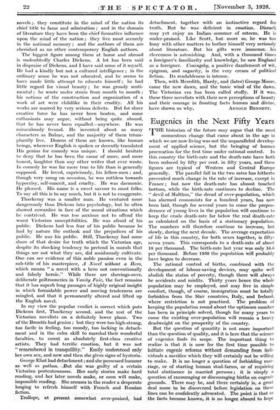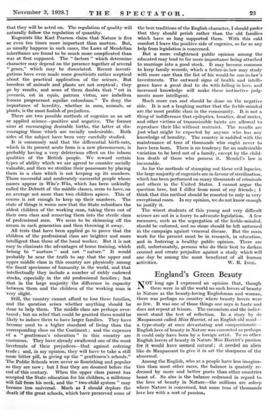Eugenics in the Next Fifty Years T HE historian of the
future may argue that the most momentous change that came about in the age in which we are now living was not the unparalleled develop- ment of applied science, but the bringing of human procreation for the first time under rational control.. In this country the birth-rate and the death-rate have both been reduced by fifty per cent. in fifty years, and these figures are typical of Western and Central Europe generally. The parallel fall in the two rates has hitherto prevented much change in the rate of increase, except in France ; but now the death-rate has almost touched bottom, while the birth-rate continues to decline. The " devil of Malthus," the dread of over-population, which has alarmed economists for a hundred years, has now been laid, though for several years to come the prepon- derance of young lives in the population will continue to keep the crude death-rate far below the real death-rate as calculated on the basis of a stationary. population. The numbers will therefore continue to increase, but slowly, during the next decade. The average expectation of life in this country, for both sexes together, is fifty- seven years. This corresponds to a death-rate of, about 18 per thousand. The birth-rate last year was only 16.6 per thousand. Before 1950 the population will probably have begun to decrease. _ , - - • The rational control of births, combined with the development of labour-saving devices, may quite well abolish the status of poverty, though there will always be accidents and misfits. Thirty years hence the whole population may be employed, and may live in simple comfort, though, of course, immigration must be totally forbidden from the Slav countries, Italy, and Ireland, where restriction is not practised. The problem of keeping the population round about the optimum number has been in principle solved, though for many years to come the existing over-population will remain a heavy deadweight on the prosperity of the country.
But the question of quantity is not more important than the question of quality, and it is here that the science of eugenics finds its scope. The important thing to realize is that it is now for the first time possible to initiate eugenic reforms without demanding from indi• , viduals a sacrifice which they will certainly not be, willing to make. It is no longer a question of forbidding mar- riage, or of starting human stud-farms, or of requiring total abstinence in married persons ; it is simply a question of encouraging or discouraging births on eugenic grounds. There may be, and there certainly is, a great deal more to be discovered before legislation on these lines can be confidently advocated. The point is that as the facts become known, it is no longer absurd to hope that they will' be acted on. The regulation of quality will naturally follow the regulation of quantity.
Eugenists like Karl Pearson claim that Nature is five or even ten times more important than nurture. But, as usually happens in such cases, the Laws of Mendelian inheritanee are found to be much more complicated than was at first supposed. The " factors " which determine character may depend on the presence together of several " genes," which may be dissociated. Recent investi- gations have even made some geneticists rather sceptical about the practical application of the science. But breeders of animals and plants are not sceptical ; they go by results, and none of them doubts 'that " est in juvencis, est in equis, patrum virtus, nee imbellem feroces- progenerant aquilae columbam." To deny the importance of heredity, whether in men, animals, or plants, is the most foolish of prejudices.
There are two possible methods of eugenics as an art or applied science—positive and negative. The former aims at encouraging desirable births, the latter at dis- couraging those which are racially undesirable. Both sides of the subject have been very carefully studied.
It is commonly said that the differential birth-rate, which in its present acute form is -a, new phenomenon, is probably having a very deleterious effect on the inborn qualities of the British people. We reward certain types of ability which we are agreed to consider socially valuable, and then we sterilize their possessors by placing them in a class which is not keeping up its numbers. Those successful and moderately successful people whose names appear in Who's Who, which has been unkindly called the Debrett of the middle classes, seem to have, on an average not more than two children apiece. This of course is not enough to keep up their numbers. The state of things is worse now that the State subsidizes the ablest children of the working man, taking them out of their own class and removing them into the sterile class of professional men. We seem to be skimming off the cream in each generation and then throwing it away.
All tests that have been applied go to prove that the children of the professional class are brighter and more intelligent than those of the hand worker. But it is not easy -to eliminate the advantages of home training, which belong to " nurture " and not " nature." It would probably be near the truth to say that the upper and upper middle class in this country are physically among the finest specimens of humanity in the world, and that intellectually they include a number of richly endowed stocks, especially in the old professional families ; but that in the large majority the difference in capacity between them and the children of the working man is very slight.
Still, the country cannot afford to lose these families, and the question arises whether anything should be done to help them: The middle class are perhaps over- taxed ; but to relief that could be granted them would be likely to induce them to have larger families. They have become used to a higher standard of living than the corresponding class on the Continent ; and the expenses of -a "gentleman's education " in this country are enormous. They have already swallowed one of the most inveterate of their prejudices—that against entering trade ; and, in my opinion, they will have to take a still more bitter pill, in giving up the " gentlenien's schools." The Public Schools were never so flourishing and popular as they are now ; but I fear they are doomed before the end of this century. When the upper class parent has accepted the State eduCation for his children, a 'millstone will fall' from his neck, and the " two-child system " may become- less universal. Much as I should deplore the death *of the great Schools, which have preserved some of the best traditions of the English character, I should prefer that they should perish rather than the old families which have so -long supported them. With this cold comfort I leave the positive side of eugenics, so far as any help from legislation is concerned.
But a more enlightened public opinion among the educated may lead to far more importance being attached to marriage into a good stock. It may become common to keep family records, -which a father-in-law may study with more care than the list of his would-be son-in-law's investments. The outward signs of health and intelli- gence have a great deal to do with falling in love, and increased knowledge will make these instinctive judg- ments more intelligent.
Much more can and should be done on the negative side. It is not a laughing matter that the feeble-minded are the most prolific class in the community. It is not a thing of indifference that epileptics, lunatics, deaf mutes, and other victims of transmissible taints are allowed to reproduce their like without restraint. The results are just what might be expected by anyone who has any knowledge of heredity. The country is saddled with the maintenance of tens of thousands who ought never to have been born. There is no tendency for an undesirable variation to be bred out of a family, except by the child- less death of those who possess it. Mendel's law is inexorable.
As for the methods of stamping out these evil legacies, the large majority of eugenists are in favour of sterilization, which has been performed on many thousands of criminals and others in the United States. I cannot argue the question -here, but I differ from most of my friends ; I think that this method should be resorted to only in very exceptional cases. In my opinion, we do not know enough to justify it.
The wisest students of this young and very difficult science are not in a hurry to advocate legislation. A few measures, such as the segregation of the feeble-minded, should be enforced, and no stone should be left unturned in the campaign against venereal disease. But the main work for the present must be in research, in education, and in fostering a healthy public opinion. There are still, unfortunately, persons who do their best to darken counsel and create prejudice against a study which will one day be among the most beneficent of all human



















































































































 Previous page
Previous page